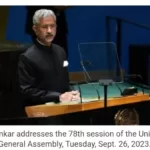Addressing the United Nations General Assembly, External Affairs Minister S. Jaishankar asserted that political expediency should not dictate responses to terrorism and extremism. This statement is made against the backdrop of escalating diplomatic tensions with Canada regarding the killing of Khalistani separatist Hardeep Singh Nijjar.
Jaishankar highlighted several critical global issues, including vaccine distribution equity, climate action, food and energy distribution, and the fight against terrorism. He stressed that these challenges should not be influenced by political convenience and urged leaders to uphold the principles of territorial integrity and non-interference in internal affairs consistently.
Jaishankar drew attention to the African Union’s recent inclusion in the G20 group and proposed that the United Nations should contemplate making the Security Council more contemporary. This assertion aligns with India’s persistent pursuit of a permanent seat on the Security Council.
The External Affairs Minister emphasized India’s vision of ‘One Earth, One Family, One Future,’ which places the concerns of many above the interests of a select few. He urged that the days of a select few nations setting global agendas were over.
Jaishankar pointed out that India’s role had evolved from non-alignment to becoming a ‘Vishwa Mitra’ (friend of the world), aiming to shoulder greater responsibilities and contribute significantly on the global stage. He cited the outcomes of the New Delhi G20 summit as examples of India’s commitment to addressing key global issues such as urban development, corruption, hunger eradication, and quality education.
The recent diplomatic tensions between India and Canada have led to reciprocal advisories for citizens in each country. Canada updated its advisory, urging its citizens in India to “remain vigilant and exercise caution.” India had previously issued a similar advisory for its citizens in Canada, warning against “anti-India activities” and “politically-condoned hate crimes.”
These tensions emerged after Canadian Prime Minister Justin Trudeau alleged Indian government involvement in the killing of Nijjar in Canada earlier this year.




